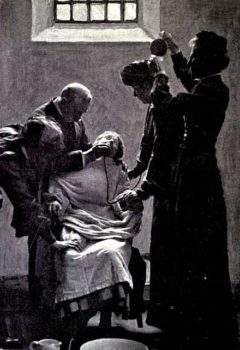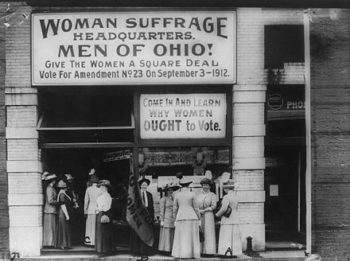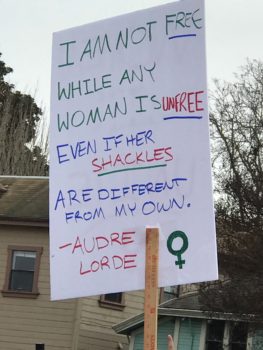THE PURPOSE OF the U.S. Memorial Day holiday is to remember the men and women who have died while serving in the military — to honor those who gave their lives in order to preserve freedom and democracy and protect the world from tyranny.
Today, in addition to honoring our fallen warriors, I would like to honor another group of warriors, even though they may not have served in the military, who have also given their lives to gain and preserve freedom, to give an equal voice to and liberate a large segment of the world’s population from long-standing and systemic oppression.
I’m talking about all those who have fought to end the oppression and slavery of women — a practice that has been going on for thousands of years all over the world and is so ingrained in our worldview, so much the status quo, that many people are in denial that it is even a real thing. An oppression which many of us mistakenly thought was lifting in the U.S., but which has come back raging, in full force, powered by religious fundamentalism spit forth from the gritted teeth of old men in government power and condoned by their subservient wives.
If it were not for the brave people — both men and women, though mostly women — women in the U.S. would not have the ability to vote, open our own bank account, buy a car or home, take out a loan, start a business, or leave abusive relationships. These are all rights that have only been gained since the 1920s. Some, since the 1970s and 80s. Rights that we now take for granted and which are still denied women in many countries around the world.
Think about it — it took 100 years of effort for women in the U.S. to gain personhood status as represented by the right to vote. Women who are well known to us now — Susan B. Anthony, Elizabeth Cady Stanton, Alice Paul, and Ida B. Wells — fought not only for the rights of women but for the anti-slavery movement as well, because they understood that all people should be considered equal and no one should suffer the injustices of inequality, regardless of race or gender.

Suffragette being force fed.
Some of these women were imprisoned, placed in solitary confinement, and then force-fed when they went on hunger strikes in protest of their treatment.
I honor them because they gave of their lives every day to fight for my freedom. I’m not sure I would have the courage to risk my livelihood in the fight for the common good — even though I have benefitted from others’ willingness to risk everything. I can march, I can write letters, I can text and phone and speak up on what platforms I have, such as this one — but I’m pretty sure I don’t have the bravery to be that kind of warrior. And so I am even more grateful for the sacrifices made by those in the past and by those who are putting themselves on the line even now.
It all comes down to physical and economic control.
If a woman is not allowed full domain over her own body, then she is not free. If she must get permission from men or from a government body to obtain healthcare of any kind, or drive, or wear the clothes she wants to wear, or walk down a street without fear of attack or harassment just because she is a woman, she is not free or equal.

Women’s Suffrage Ohio Headquarters, circa 1913
And though, in this country women are freer than in many other places, we still have not achieved full equality with men. Yet religious conservatives are now attempting to strip our hard-gained freedoms away and return to the “good old days” when women “knew their place.” We must not let that happen. We cannot go backward in time or allow the government to take control of our bodies.
We must not shrug our shoulders or allow ourselves to feel helpless. Women are, after all, the majority of the world’s population. We need to recognize the power we have and begin to wield that power to bring balance to the world.
And so, I honor the women, those long gone and those still alive, who have raised their voices and placed their bodies or reputations at risk for the sake of all women. It is no coincidence that many of these women are writers in addition to their many other activist roles, as writing is one of the most powerful ways we can spread our message.
Here are just a few, not in any order:
- Mary Wollstonecraft, Susan B. Anthony, Alice Stone Blackwell, Elizabeth Cady Stanton, Emmeline Pankhurst, Sojourner Truth — for the right to vote.
- Simone de Beauvoir — for raising the consciousness of so many women and calling out patriarchy through her writing.
- Eleanor Roosevelt — for being the first First Lady to publicly speak out for women’s equality and take on human rights issues on the international front.
- Betty Friedan — for authoring The Feminine Mystique and spending her life as a women’s rights activist and speaker.
- Gloria Steinem — for leading the “women’s liberation movement,” beginning in the 1960s and continuing to lead in the feminist movement today.
- Angela Davis — a fierce and sometimes controversial trailblazer, she has not given up the fight as a champion of women’s rights and particularly for black women.
- Barbara Walters — for paving the way for women journalists and TV anchors to enter the field.
- Coretta Scott King — For her civil rights work and helping to found the National Organization for Women (NOW).
- Maya Angelou — for her poetry, powerful writing, and inspiration to overcome race and gender discrimination.
- Ruth Bader Ginsburg — for helping to blaze the path for women in what was once a male-only profession, founding the Women’s Rights Project at the ACLU, and continuing advocacy for women’s equality and rights.
- Oprah Winfrey — for being a model of success for women of all races and promoting leadership skills for young women.
- Malala Yousafzai — for her courage in the fight for girls’ access to education in Pakistan and all over the world.
- Hillary Clinton — for being the only First Lady to run for political office and first female presidential candidate who has faced and stood up to relentless sexism in her work to advance the status and role of women.
- Chimamanda Ngozi Adichie — author of We Should All be Feminists, for her continuing advocacy for women’s rights around the world.
- Roxane Gay — for her inspirational writing and strong voice on women’s and related human rights issues, including those of race, gender and sexual identity, and disability.
- Patrisse Cullors — for co-founding Black Lives Matter and fighting for the rights of black and queer women.
- Tarana Burke — for instigating the #MeToo movement, which has inspired so many victims of sexual assault to speak out about their experiences, raise national consciousness and bring to light the pervasive and insidious nature of sexual oppression.
- Rebecca Solnit — for her unvarnished reporting, persistent advocacy for human rights and environmentalism, and for being a voice of hope in this sometimes hopeless-seeming political environment in which we are now immersed.
To these women and so many, many more — thank you, thank you, thank you.

Sign at Women’s March, 2019 – Napa, CA







I recall how proud my grandmother was to exercise her right to vote–the right of which was vote for and achieved during her early adulthood. She was my personal hero who embattled the system that told her she couldn’t run her husband’s business after he died. Yet she did. Like the famous women you mentioned, you paved the way for other women to own, operate, and manage their own businesses and lives. I salute the many women I’ve known who exemplify the spirit that your mention. Thanks for sharing! 🙂
And thank you, Sara, for sharing your story about your mother. My mother was also a strong woman who rejected and constantly pushed against the boundaries society set for women, though she would never have called herself a feminist. It’s to women like these that we owe our sense of empowerment.
Thanks, Amber, for this list. Audre Lorde, of course. And my current shero: adrianne marie brow, author of Emergent Strategies.